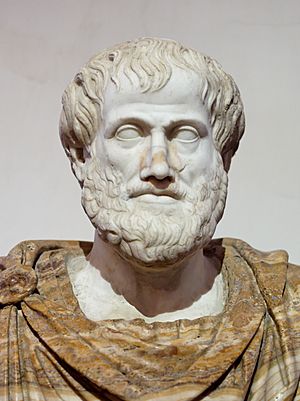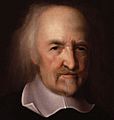Empiricism facts for kids

In philosophy, empiricism is a big idea that says almost all our knowledge comes from experience. Think about it: how do you know a stove is hot? You might have touched one before, or seen someone else touch one and react. That's experience!
When we talk about 'experience' in this way, it often means information we get through our senses. So, we learn about the world by seeing, hearing, touching, tasting, and smelling things. We can't really know something unless our senses give us information about it.
Important thinkers like John Locke, George Berkeley, and David Hume helped explain these ideas in the 1600s and 1700s. They built on older ideas from philosophers like Aristotle. Empiricism is one of many ways people try to understand how we know things. This part of philosophy is called epistemology, which means "the study of knowledge."
Contents
What is Empiricism?
Empiricism is a way of thinking about how humans learn. It suggests that our minds are like a blank slate when we are born. We don't come into the world with a lot of built-in knowledge. Instead, we gain knowledge as we live and interact with the world around us.
Learning Through Our Senses
Imagine you're learning about a new animal, like an elephant. How do you know what it looks like, sounds like, or how big it is? You might see pictures, hear its trumpet, or even touch its rough skin at a zoo. All this information comes through your senses. Empiricism says this is how most of our understanding forms. We observe things, and those observations become our knowledge.
Experience Builds Knowledge
Think about learning to ride a bike. You don't just read a book and suddenly know how. You have to try it, fall down, and try again. Each time you try, you gain experience. This experience teaches you balance, steering, and pedaling. Empiricism believes that all our skills and understanding grow this way, through direct experience.
Key Thinkers in Empiricism
Many philosophers have explored the idea of empiricism over time. Some of the most famous ones lived in Britain and are known as the "British Empiricists."
Aristotle's Early Ideas

Long ago, the Greek philosopher Aristotle (who lived from 384 to 322 BC) had ideas that were similar to empiricism. He believed that knowledge starts with observing the world around us. He studied nature very closely and thought that we learn by looking at facts and patterns. His work laid some groundwork for later empiricist ideas.
John Locke and the Blank Slate
John Locke (1632–1704) was an English philosopher. He famously said that our minds are like a "tabula rasa," which means a "blank slate" in Latin. He believed that when we are born, our minds are empty. All our ideas and knowledge come from our experiences. These experiences can be from our senses (like seeing a color) or from thinking about our own minds (like feeling happy).
George Berkeley and Perception

George Berkeley (1685–1753) was an Irish philosopher. He took Locke's ideas even further. Berkeley argued that things only exist if they are perceived. For example, a tree in a forest only exists if someone is there to see it, or if it's in God's mind. His famous saying was "to be is to be perceived." This means our understanding of the world is completely based on our perceptions.
David Hume's Skepticism

David Hume (1711–1776) was a Scottish philosopher. He was very important in the history of empiricism. Hume agreed that knowledge comes from experience. However, he also questioned how much we can truly know. He wondered if we can really prove things like cause and effect (that one thing always leads to another). His ideas made many philosophers think deeply about the limits of human knowledge.
Empiricism in Science
Empiricism is super important for science. Scientists rely on observation and experiments to learn about the world. They don't just guess; they test their ideas. This is a very empiricist approach. They gather data through their senses (or tools that extend their senses) and then use that data to form theories.
The Scientific Method
The scientific method is a great example of empiricism in action. Scientists:
- Make observations (using their senses).
- Form a hypothesis (an educated guess).
- Design experiments to test the hypothesis.
- Collect data from the experiments.
- Analyze the data to see if their hypothesis was right.
This whole process is built on the idea that experience and observation are the best ways to gain knowledge.
Empiricism Today
Empiricism continues to be a powerful idea. It helps us understand how we learn and how science works. While some philosophers argue that we also have some knowledge that doesn't come from experience (like basic math rules), empiricism reminds us how much we depend on our senses and interactions with the world to build our understanding.
Images for kids
-
A drawing of Ibn Sina (Avicenna) from 1271
-
David Hume's empiricism led to numerous philosophical schools.
See also
 In Spanish: Empirismo para niños
In Spanish: Empirismo para niños
 | Lonnie Johnson |
 | Granville Woods |
 | Lewis Howard Latimer |
 | James West |








